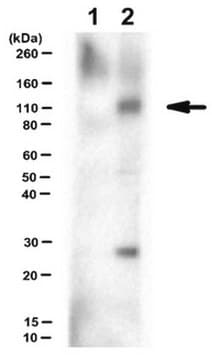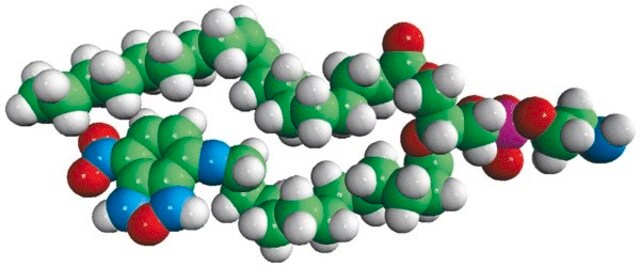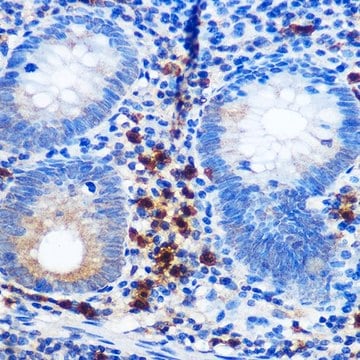ABS1511
Anti-Neph1 Antibody, cytoplasmic domain
from rabbit, purified by affinity chromatography
Synonym(e):
Kin of IRRE-like protein 1, Kin of irregular chiasm-like protein 1, Nephrin-like protein 1, Neph1, cytoplasmic domain
About This Item
Empfohlene Produkte
Biologische Quelle
rabbit
Qualitätsniveau
Antikörperform
affinity isolated antibody
Antikörper-Produkttyp
primary antibodies
Klon
polyclonal
Aufgereinigt durch
affinity chromatography
Speziesreaktivität
mouse, rat, human
Methode(n)
electron microscopy: suitable
immunocytochemistry: suitable
immunofluorescence: suitable
immunoprecipitation (IP): suitable
western blot: suitable
NCBI-Hinterlegungsnummer
UniProt-Hinterlegungsnummer
Versandbedingung
wet ice
Posttranslationale Modifikation Target
unmodified
Angaben zum Gen
human ... KIRREL1(55243)
Allgemeine Beschreibung
Spezifität
Immunogen
Anwendung
Zelluläre Signaltransduktion
Signalübertragung & Neurowissenschaft
Western Blotting Analysis: A representative lot detected ischemia-induced Neph1 membrane-to-cytosol translocation in human podocytes (Wagner, M.C., et al. (2008). J Biol Chem. 283(51):35579-35589).
Western Blotting Analysis: A representative lot detected Neph1 in mouse glomeruli & cultured human podocytes (Arif, E., et al. (2011). Mol Cell Biol. 31(10):2134-2150).
Immunoprecipitation Analysis: A representative lot immunoprecipitated Neph1 from rat glomerular and human podocyte cell lysates (Arif, E., et al. (2011). Mol Cell Biol. 31(10):2134-2150).
Immunofluorescence Analysis: A representative lot detected Neph1 using both paraffin-embedded and frozen rat kidney sections (Arif, E., et al. (2011). Mol Cell Biol. 31(10):2134-2150; Barletta, G.M., et al. (2003). J Biol Chem. 278(21):19266-19271).
Electron Microscopy Analysis: A representative lot detected Neph1 in frozen rat kidney sections (Barletta, G.M., et al. (2003). J Biol Chem. 278(21):19266-19271).
Immunocytochemistry Analysis: A representative lot detected Neph1 in cultured human podocytes (Arif, E., et al. (2014). J Biol Chem. 289(14):9502-9518; Arif, E., et al. (2011). Mol Cell Biol. 31(10):2134-2150; Wagner, M.C., et al. (2008). J Biol Chem. 283(51):35579-35589).
Qualität
Western Blotting Analysis: A 1:1,000 dilution of this antibody detected Neph1 in rat kidney tissue lysate.
Zielbeschreibung
Physikalische Form
Lagerung und Haltbarkeit
Handling Recommendations: Upon receipt and prior to removing the cap, centrifuge the vial and gently mix the solution. Aliquot into microcentrifuge tubes and store at -20°C. Avoid repeated freeze/thaw cycles, which may damage IgG and affect product performance.
Note: Variability in freezer temperatures below -20°C may cause glycerol containing solutions to become frozen during storage.
Sonstige Hinweise
Haftungsausschluss
Sie haben nicht das passende Produkt gefunden?
Probieren Sie unser Produkt-Auswahlhilfe. aus.
Lagerklassenschlüssel
10 - Combustible liquids
WGK
WGK 3
Analysenzertifikate (COA)
Suchen Sie nach Analysenzertifikate (COA), indem Sie die Lot-/Chargennummer des Produkts eingeben. Lot- und Chargennummern sind auf dem Produktetikett hinter den Wörtern ‘Lot’ oder ‘Batch’ (Lot oder Charge) zu finden.
Besitzen Sie dieses Produkt bereits?
In der Dokumentenbibliothek finden Sie die Dokumentation zu den Produkten, die Sie kürzlich erworben haben.
Unser Team von Wissenschaftlern verfügt über Erfahrung in allen Forschungsbereichen einschließlich Life Science, Materialwissenschaften, chemischer Synthese, Chromatographie, Analytik und vielen mehr..
Setzen Sie sich mit dem technischen Dienst in Verbindung.








